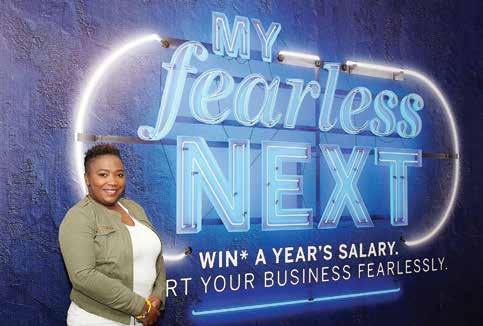
6 minute read
Banking and financial services
New sectors and new licences are creating opportunities.
An entirely new economic sector has opened up in South Africa within the last decade – renewable energy. Financing for this investment segment has come from South Africa’s sophisticated banking sector and from the cash reserves of some European utilities. The Power and Infrastructure division of Standard Bank, one of Africa’s biggest companies, was involved in about 40% of the projects approved within the first four rounds of the bidding process.
Advertisement
South Africa’s banking and financial services sector looks quite different compared to 10 years ago in two other important ways. Firstly, the move to ever-more sophisticated IT applications has accelerated (and moved a long way from the first ATMs launched by Standard Bank in 1981). The related change is the issuing of banking licences to newcomers offering digital banking instead of tellers and deposit slips.
The first new bank to receive a licence since Capitec in 1999 was Tyme Digital in 2017. Tyme stands for Take Your Money Everywhere and refers to its plans which do not include a branch network. Commonwealth Bank of Australia bought a controlling share of Tyme when it was a loans company and African Rainbow Capital (ARC) was originally the venture’s BEE partner, but in August 2018 ARC bought out the Australians. The bank is targeting the lower-income segment and is rolling out access to its services through machines in major retailers like Shoprite and Pep and Boxer stores.
A study by EY reports that 35% of digitally active South Africans use fintech and banks are responding quickly to this. Bank Zero, which has a provisional licence and is led by former FNB bank leaders, calls itself an “app-driven” bank. Discovery Bank has the advantage of having access to vast stores of data through all the other businesses in the Discovery group. The other bank close to gaining a licence is Post Bank, a division of the Post Office.
In 2019, the banking sector globally will spend more than R100-billion on artificial intelligence (Citi GPS). Moneyweb calculated that the Big Four banks spent R30billion on ICT in 2016, a sign of how seriously the technology challenge is being taken. Capitec, which is counted in some quarters as part of a new Big Five, recently spent R348million on Creamfinance which will allow for machine learning
SECTOR INSIGHT
African Rainbow Capital has acquired a majority share in Tyme Digital Bank.
to be applied to online credit applications. Fifteen new Capitec branches will have no cashiers. Since its listing in 2012, Capitec shares have risen by 52 000%, a better performance even than Apple, which achieved “only” 9 000% (Business Times).
PwC’s Major Banks Analysis reported that the four banks in its study had combined headline earnings of R76.1-billion at 31 December 2017, an annualised improvement of 5.2%. The banks covered were Barclays Africa, FirstRand, Nedbank and Standard Bank.
Merchant banking and investment banking are the most competitive sectors in South Africa with companies such as BoE Private Clients, Rand Merchant Bank and Investec prominent.
Afgri, South Africa’s largest agricultural company, which already offers financial services, bought the South African Bank of Athens in 2017. Most South African agricultural companies have financial divisions.
Financial services group Old Mutual (a 54% stakeholder in Nedbank) is in the process of creating four stand-alone businesses out of the Old Mutual Group.
The insurance market has become more varied over time, with a greater variety of products available to more market segments, including middle-income earners. An example of a product responding to new realities is Old Mutual’s iWYZE medical gap cover, designed to pay the difference between what a medical aid scheme is willing to pay and what the hospital or doctor is charging.
The Chartered Institute of Government Finance, Audit and Risk Officers advises institutions, trains it members in public finance and promotes the interests of professionals in the public sector. It also develops and assesses qualifications and advises tertiary institutions on the requirements for courses.
The African Institute of Financial Markets and Risk Management at the University of Cape Town has a strong focus on research. Among the alumni of the Vunani Securities Training Academy, sponsored for a decade by Coronation Fund Managers, is First National Bank chief economist Sizwe Nxedlana.
ONLINE RESOURCES
Banking Association of SA: www.banking.org.za Financial Services Board: www.fsb.co.za Insurance Institute of South Africa: www.iisa.co.za South African Institute for Chartered Accountants: www.saica.co.za South African Reserve Bank: www.resbank.co.za Stock exchanges
The JSE is the world’s 19th biggest exchange and nearly 400 companies are listed on the JSE or AltX, the JSE-owned exchange for smaller companies. Other investment options that are available through the JSE are Yield X (interest rate and currency instruments), the South African Futures Exchange (SAFEX) and the Bond Exchange of South Africa (BESA).
In 2017, several new exchanges won regulatory approval, with ZAR X winning the nod from the Financial Services Board (FSB) against objections by the established JSE and another new exchange, 4AX. Shortly after winning its court case, ZAR X started trading in Senwesbel, the holding company of one of South Africa’s biggest agricultural trading companies, Senwes. There is no trading in derivatives or high-frequency trading on this exchange.
A2X will offer secondary listings platform for JSE-listed companies and aims to cut costs for investors. African Rainbow Capital is an investor in A2X. 4 Africa Exchange (4AX) will focus on companies with market capitalisation of up to R8-billion. Agricultural trading company NWK is a shareholder in this venture.
The newcomers all promise to use the latest technology to make trading simpler, quicker and cheaper.


The hustle to be the best you can be, never stops. It involves deciding what your Next is and going for it. But many budding entrepreneurs remain side-hustlers, because they need a steady income to make that Next a reality. Winning a R1 million salary for the next year in Standard Bank’s My Fearless Next has made that dream a reality for Nonhlanhla Mthethwa. Nonhlanhla, an HR practitioner from Pietermaritzburg, believes the win will allow her company, Girlz Ink, and the African dolls they manufacture to become the next big thing. “My Fearless Next has provided me with a key to open the door to Girlz Ink a bit wider. I am going forward knowing that, even if I hadn’t won, I am wiser and better equipped to survive in a competitive business world.“ Nonhlanhla really took to the business boot camps on the business reality TV show and is using lessons learned about marketing and direct selling to boost her business.
“This opportunity means so much to me. We lost a lot of stock of our Baby Thando dolls in a re, which put a deal with Toys R Us on hold. Now we’ll be able to seal that deal. I also met so many smart people with great businesses on the show — even a new business partner to design clothes for our dolls.” Nonhlanhla’s plans to grow self-love through her black dolls will also see the Girlz Ink brand expand to children’s accessories including clothing, schoolbags and luggage. “I wanted to celebrate our vast ethnic diversity by giving kids a chance to play with dolls that re ect their own identities. We’re not only helping them build positive self-images and pride in who they are, but also fostering a society where children can learn about each other’s cultures, because all kids can play with our dolls.”










